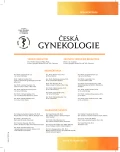Inflammatory bowel disease during pregnancy and childbirth
Authors:
K. Závorová
Authors‘ workplace:
Gynekologicko-porodnické oddělení Nemocnice Hořovice, primář oddělení MUDr. A. Klán
Published in:
Ceska Gynekol 2017; 82(2): 108-116
Overview
Objective:
The aim is to give basic information about inflammatory bowel disease (IBD) during pregnancy, to highlight the importance of treatment in pregnancy and also show our own experience with the issue.
Design:
Original work – a retrospective study.
Setting:
Department of Obstetrics and Gynecology, Hospital Hořovice.
Results:
We provide basic overview information about inheritance, fertility, mutual influence of IBD and pregnancy therapy in pregnancy and childbirth options for patients with IBD. We present also the results of the group of 17 patients with varying degrees of disability IBD (including patients after previous surgeries – bowel resection, hemicolectomy, ileostomy or with a pouch) that gave birth to our workplace.
Conclusion:
A crucial factor for good results is the degree of inflammation at the time of conception and during pregnancy. If the disease is inactive and nutrition of the diseased sufficient, there is no decrease in fertility, course of pregnancy is seamless, there is no greater risk of deterioration of disease in pregnancy and pregnancy do not differ from the normal population. The opposite situation occurs if there is a pregnancy at the time of disease activity. Then up to 75% pregnancy courses with big problems, fertility is declining, inflammation is also worsening and the risk of exacerbations increases during pregnancy, which aggravates the course of pregnancy and childbirth and has a negative effect on the fetus. Pregnancy is therefore necessary to plan for a longer period of disease stabilization and continue chronic medication and not discontinue drugs for fear of negative impact of medications on fetal development. On the contrary, active inflammation of the mother during pregnancy poses a greater risk to the fetus than adequate treatment. Commonly used drugs-aminosalicylates, corticosteroids, immunosuppressants and biological therapy appears to be safe and well tolerated during pregnancy. Method of delivery is individual and depends on the form and location of the inflammation and the preceding operations.
Keywords:
inflammatory bowel disease, Crohn‘s disease, ulcerative colitis, pregnancy, childbirth, breastfeeding
Sources
1. Alstead, EM., Nelson-Piercy, C. Inflammatory bowel disease in pregnancy. Dostupné z: http://www.ncbi.nlm.nih.gov/pmc/articles/PMC1774968/
2. Alstead, EM. Inflammatory bowel disease in pregnancy. Postgradual Med J, 2002, 78, p. 23–26.
3. Ferguson, CB. Inflammatory bowel disease in pregnancy. BMJ, 2008, 337 doi: http://dx.doi.org/10.1136/bmj.39566.681458.BE (Published 03 July 2008) Cite this as: BMJ 2008;337:a427 Dostupné z: http://www.bmj.com/content/337/bmj.39566.681458.BE
4. Kment, M. Idiopatické střevní záněty v graviditě. Inter Med pro praxi 2008, 10(7 a 8), s. 333–335.
5. Kment, M. Choroby gastrointestinálního traktu v graviditě. Praha: Triton, 2003, s. 43–61.
6. Koželuhová, J. Biologická terapie u pacientek s idiopatickými střevními záněty v graviditě. Prakt Gynekol, 2014, 18(3), s. 190–194.
7. Kwan, LY., Mahadevan, U. Inflammatory bowel disease and pregnancy: An update. Expert Rev Clin Immunol, 2010, 6(4), p. 643–657.
8. Lukáš, K., Pařízek, A. Idiopatické střevní záněty a těhotenství. Čas Lék čes, 2010, 149, s. 163–172.
9. Obrtlík, M. Idiopatické střevní záněty. Kardiol Rev Int Med, 2014,16(3), s. 240–243.
10. Peppercon, MA., Mahadevan, U. Fertility, pregnancy and nursing in inflammatory bowel disease. Dostupné z : http://www.uptodate.com/contents/fertility-pregnancy-and-nursing-in-inflammatory-bowel-disease
11. Peppercon, MA., Mahadevan, U. Patient information: Inffalmmatory bowel disease and pregnancy. Dostupné z: http://www.uptodate.com/contents/inflammatory-bowel-disease-and-pregnancy-beyond-the-basics
12. Pintérová Kolesárová, M., Pintér, M. Vliv idiopatického střevního zánětu na interval potřebný pro početí pacientek. Čes Gynek, 2008, 73, 2, s. 109–112.
13. ECCO Guidelines/ Consensus Paper
Van der Woude, CJ. The Second European Evidenced-Based consensus on Reproduction and Pregnancy in Inflammatory Bowel Disease, J Crohn´s and Colitis, 2015, p. 1–18. Dostupné z.: https://www.ecco-ibd.eu/images/6_Publication/6_3_ECCO%20Guidelines/FINAL_MASTER_JCC_Online_PulishedVersion_PregnancyGuidelines_2015_Doi101093_jju006.pdf
Oresland, T. European evidence based consensus on surgery for ulcerative colitis – special situation. J Crohn´s and Colitis, 2015, p. 14–15. Dostupné z: http://ecco-jcc.oxfordjournals.org/content/eccojc/9/1/4.full.pdf
Van Assche, G. The second European evidence-based Consensus on the diagnosis and management of Crohn‘s disease: Special situations. J Crohn´s and Colitis, 2010, 4, p. 76–80. Dostupné z: http://ecco-jcc.oxfordjournals.org/content/eccojc/4/1/63.full.pdf
Labels
Paediatric gynaecology Gynaecology and obstetrics Reproduction medicineArticle was published in
Czech Gynaecology

2017 Issue 2
Most read in this issue
- Uterine inversion
- Inflammatory bowel disease during pregnancy and childbirth
- Czech linguistic validation of the Pelvic Organ Prolapse/ Urinary Incontinence Sexual Questionnaire – IUGA revised
- Ultrasound diagnosis of fetal inflammatory response syndrome in women with preterm premature rupture of membrane
